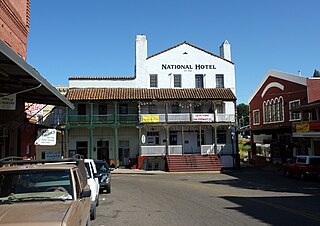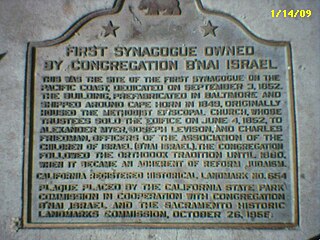
Jackson is a city in and the county seat of Amador County, California. Its population was 4,651 at the 2010 census, up from 3,989 at the 2000 census. The city is accessible by both State Route 49 and State Route 88.

State Route 49 is a north–south state highway in the U.S. state of California that passes through many historic mining communities of the 1849 California gold rush and it is known as the Golden Chain Highway. The highway's creation was lobbied by the Mother Lode Highway Association, a group of locals and historians seeking a single highway to connect many relevant locations along the Gold Rush to honor the 49ers. One of the bridges along SR 49 is named for the leader of the association, Archie Stevenot.
The Golden Empire Council (GEC-BSA) is a California-based 501(c)(3) nonprofit affiliated with the Boy Scouts of America and its Western Region, Area 4. The council serves a large section of Northern California, primarily the Sacramento Valley and the northern Sierra Nevada. Its boundaries range north to south from Redding to Elk Grove and west to east from Vacaville to Pollock Pines and include 16 Northern California Counties. Its council headquarters and service center is located in Sacramento. The council also operates two Scout Shops selling BSA merchandise; located in Sacramento and Chico.

B'nai Israel Synagogue is a Modern Orthodox synagogue located in the historic Jonestown neighborhood, near downtown and the Inner Harbor of Baltimore, Maryland, in the United States. The synagogue is one of the oldest synagogue buildings in the United States.
Congregation Beth Israel is a Modern Orthodox synagogue in Berkeley, California, in the United States. Established in 1924 as the Berkeley Hebrew Center, it traces its origins to the First Hebrew Congregation of Berkeley, founded in 1909. It was Berkeley's first synagogue and remains its oldest. Lay-led for four decades, it hired its first rabbi, Saul Berman, in 1963.

Congregation B'nai Israel is a Reform Jewish congregation and synagogue, located at 3600 Riverside Boulevard, in Sacramento, California, in the United States. Founded in 1852 as an Orthodox community, the congregation is the oldest Jewish congregation in Sacramento. The congregation dates the California Gold Rush of 1849, when Jewish settlers gathered to observe the High Holy days. The congregation purchased its first building at 7th and L streets on September 2, 1852, making it the first synagogue west of the Mississippi River.

B'nai Jeshurun is a non-denominational Jewish synagogue located at 257 West 88th Street and 270 West 89th Street, on the Upper West Side of Manhattan, in New York City, New York, United States.
In the United States, Canada, Australia, and elsewhere, a pioneer cemetery is a cemetery that is the burial place for pioneers. American pioneers founded such cemeteries during territorial expansion of the United States, with founding dates spanning, at least, from the late 18th to early 20th centuries.
Middle Bar is a former mining town on the Mokelumne River in Amador County, California. It is a California Historical Landmark.

The Sonora Hebrew Cemetery, also known as Pioneer Jewish Cemetery, is an inactive Jewish cemetery founded in c. 1851, and located in Sonora, California. This was the first Jewish cemetery in the Gold Rush region.
Marysville Hebrew Cemetery also known as Marysville Jewish Cemetery, and Jewish Cemetery of Marysville, is a no longer active Jewish cemetery founded in 1855 by the Marysville Hebrew Benevolent Society, and is located at the southeast corner of Marysville Cemetery, in Marysville, California. In 1945, the cemetery was abandoned and forgotten; by 1995 it was restored.
Nevada City Jewish Cemetery is a no longer active Jewish cemetery founded in 1854 by the Nevada Hebrew Society, and located in Nevada City, Nevada County, California. The last burial was during the summer of 1890. There are only 29 headstones that are visible. On October 29, 1972, the site was dedicated as a historical site.
Chevra Kaddisha Cemetery, later known as Home of Peace Cemetery, was the first Jewish cemetery in California founded on November 12, 1850, by the Sacramento City Hebrew Association, and was once located at 33rd at K Streets in the East Sacramento neighborhood of Sacramento, California. The cemetery closed around 1924, and is no longer standing. It is the location of a strip mall, there is no historical plaque.
The Pioneer Jewish Synagogue was a former Jewish synagogue located in Jackson in Amador County, California, in the United States. Built in 1857, the congregation vacated the building in 1869, and the former synagogue building was demolished in 1948.
Grass Valley Pioneer Jewish Cemetery, also known as Shaar Zedek is a no longer active Jewish cemetery founded in 1856 by the Hebrew Benevolent of Society of Grass Valley, and is located in Grass Valley, California, U.S. The last burial happened in 1891. It is a private site operated by the Commission for the Preservation of Pioneer Jewish Cemeteries and Landmarks in the West and is not open to the public.
Pioneer Jewish Cemetery may refer to:
Placerville Pioneer Jewish Cemetery is a no longer active Jewish cemetery founded in 1854 by the Placerville Hebrew Benevolent Society, and is located in Placerville, California. The last burial happened in 1968. It is a private site operated by the Commission for the Preservation of Pioneer Jewish Cemeteries and Landmarks in the West and is not open to the public.
Pioneer Baby's Grave is a historical site in Redding, California in Shasta County. Pioneer Baby's Grave is a California Historical Landmark No. 377 listed on July 28, 1942. George and Helena Cohn Brownstein lived in Red Bluff. There infant son, 8-month-old, Charles Brownstein died on December 14, 1864. As there was Jewish cemetery in Red Bluff, George and Helena traveled 40 miles in two-days by covered wagon to a Jewish cemetery founded in 1857 by the Shasta Hebrew Congregation, Shasta Hebrew Benevolent Society. Charles was interred in Shasta Hebrew Congregation's Jewish cemetery, the first one found in the region. When California State Route 299 was built in 1923, the plans route the highway as to not disturb the grave. The Jewish cemetery was neglected for some years, till in 1976 when the Redding Jewish Community Center was founded. The site is now cared for by the Jewish Community Center.






